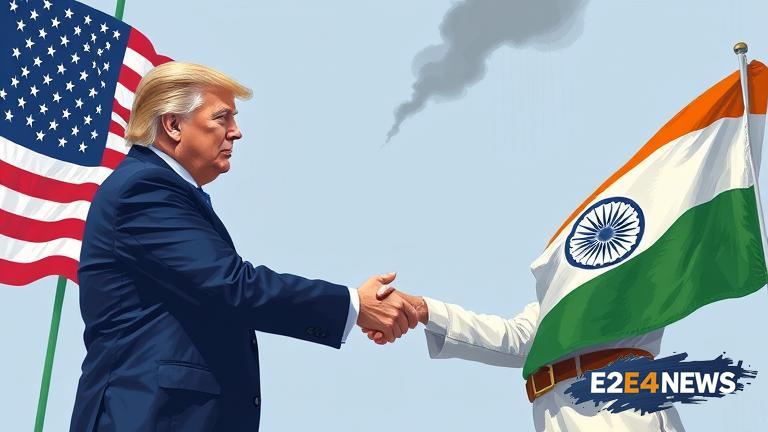The United States and India are on the brink of a trade war as President Trump threatens to impose higher tariffs on Indian goods due to the country’s increasing trade with Russia, particularly in the oil sector. The move has sparked concerns over the potential impact on the global economy, as well as the already strained relations between the two nations. India has been one of the largest buyers of Russian oil, despite international sanctions imposed on Russia due to its invasion of Ukraine. The US has been critical of India’s decision to continue trading with Russia, citing concerns over national security and the need to isolate Russia economically. President Trump has been vocal about his dissatisfaction with India’s trade policies, and has threatened to impose higher tariffs on Indian goods, including textiles, pharmaceuticals, and steel. The tariffs could have a significant impact on India’s economy, which is already facing challenges due to the COVID-19 pandemic. The Indian government has defended its decision to trade with Russia, citing the need to diversify its energy sources and reduce its dependence on other countries. However, the US has argued that India’s actions are undermining the international effort to isolate Russia and are potentially harming the global economy. The trade tensions between the US and India have been escalating over the past few months, with both countries imposing tariffs on each other’s goods. The situation has been further complicated by the fact that India is a key player in the Quadrilateral Security Dialogue, a grouping of countries that includes the US, Japan, and Australia, which aims to promote cooperation and stability in the Indo-Pacific region. The US has been keen to strengthen its ties with India, which is seen as a key partner in the region, but the trade tensions have put a strain on the relationship. The Indian government has been trying to navigate the situation, while also maintaining its relations with Russia, which is a key strategic partner. The trade war between the US and India could have far-reaching consequences, including higher prices for consumers, job losses, and a decline in economic growth. The situation is being closely watched by other countries, including China, which has been seeking to expand its influence in the region. The US has been critical of China’s trade practices, and has imposed tariffs on Chinese goods, leading to a trade war between the two countries. The trade tensions between the US and India are likely to continue, with both countries dug in on their positions. The situation is a complex one, with multiple factors at play, including geopolitical considerations, economic interests, and national security concerns. The outcome is uncertain, but one thing is clear: the trade war between the US and India has the potential to have significant consequences for the global economy. The US and India need to find a way to resolve their differences and work towards a more cooperative relationship, one that takes into account the interests of both countries. The trade tensions are a reminder of the complexities of international trade and the need for countries to work together to promote cooperation and stability. The situation is a challenge for both countries, but it also presents an opportunity for them to strengthen their relationship and promote economic growth. The US and India have a long history of cooperation, and it is in the interests of both countries to find a way to resolve their differences and work towards a more positive relationship. The trade war is a setback, but it is not insurmountable, and with diplomacy and cooperation, the two countries can find a way forward. The global economy is watching the situation closely, and it is in the interests of all countries to promote cooperation and stability. The US and India must find a way to resolve their differences and work towards a more cooperative relationship, one that promotes economic growth and stability.





